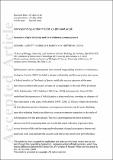Files in this item
Genomics of hybridization and its evolutionary consequences
Item metadata
| dc.contributor.author | Abbott, Richard J. | |
| dc.contributor.author | Barton, Nicholas H. | |
| dc.contributor.author | Good, Jeffrey M. | |
| dc.date.accessioned | 2017-05-04T23:33:39Z | |
| dc.date.available | 2017-05-04T23:33:39Z | |
| dc.date.issued | 2016-06-08 | |
| dc.identifier | 242396605 | |
| dc.identifier | d3a4564e-3e74-4bc6-8cf0-ef3c567cd0fb | |
| dc.identifier | 84973449238 | |
| dc.identifier | 000378941100001 | |
| dc.identifier.citation | Abbott , R J , Barton , N H & Good , J M 2016 , ' Genomics of hybridization and its evolutionary consequences ' , Molecular Ecology , vol. 25 , no. 11 , pp. 2325-2332 . https://doi.org/10.1111/mec.13685 | en |
| dc.identifier.issn | 1365-294X | |
| dc.identifier.other | Bibtex: urn:afd68d8e404baaccaf777d5f422767dc | |
| dc.identifier.uri | https://hdl.handle.net/10023/10708 | |
| dc.description.abstract | Hybridization and its consequences have been of longstanding interest to evolutionary biologists. Darwin (1859) included a chapter on hybrids and the expression and causes of hybrid sterility in The Origin of Species, while the main proponents of the neo-Darwinian synthesis discussed the topic at varying length in the mid-1900s (Haldane 1932; Dobzhansky 1937; Stebbins 1950; Mayr 1963). Subsequently, Grant (1981) underlined the importance of hybridization to plant evolution, devoting six chapters of Plant Speciation to the topic, while Arnold (1997; 2006; 2015) has written three books on hybridization and its evolutionary consequences over the last 20 years. Building upon this enduring foundation, there has been an enormous expansion in the study of hybridization over the past decade. This exciting resurgence has been fuelled by advances in DNA sequencing that now enable the rapid collection of genomic data across the tree of life and the ongoing development of population genetic theory and analytical tools that facilitate the analysis and interpretation of these powerful data. | |
| dc.format.extent | 600821 | |
| dc.language.iso | eng | |
| dc.relation.ispartof | Molecular Ecology | en |
| dc.subject | QH426 Genetics | en |
| dc.subject.lcc | QH426 | en |
| dc.title | Genomics of hybridization and its evolutionary consequences | en |
| dc.type | Journal article | en |
| dc.contributor.institution | University of St Andrews. School of Biology | en |
| dc.contributor.institution | University of St Andrews. Scottish Oceans Institute | en |
| dc.contributor.institution | University of St Andrews. St Andrews Sustainability Institute | en |
| dc.identifier.doi | https://doi.org/10.1111/mec.13685 | |
| dc.description.status | Peer reviewed | en |
| dc.date.embargoedUntil | 2017-05-04 |
This item appears in the following Collection(s)
Items in the St Andrews Research Repository are protected by copyright, with all rights reserved, unless otherwise indicated.

